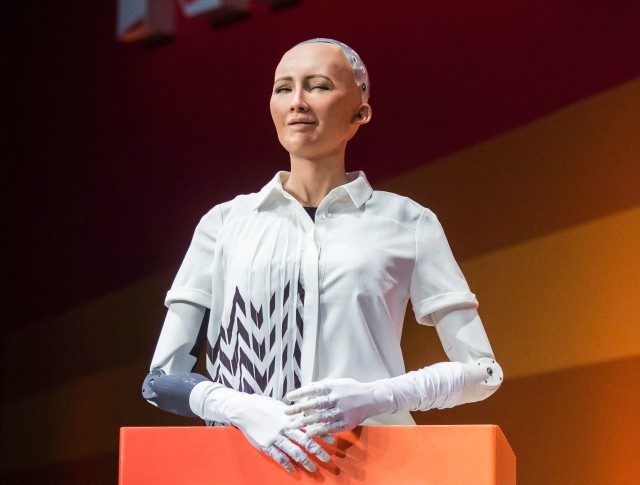Saudi Arabia became the first country to grant a robot citizenship this week, prompting critics to note the robot may have more rights than women in the country.
The robot, named “Sophia,” took to the stage at Saudi Arabia’s Future Investment Initiative on Wednesday, where it was interviewed in what many speculated to be a scripted conversation.
“I am very honored and proud for this unique distinction. This is historical to be the first robot in the world to be recognized with a citizenship,” Sophia declared in response to Saudi Arabia granting it citizenship. “I want to live and work with humans so I need to express the emotions to understand humans and build trust with people.”
When asked whether robots are conscious, Sophia replied, “Well let me ask you this back, how do you know you are human? I want to use my artificial intelligence to help humans live a better life, like design smarter homes, build better cities of the future. I will do my best to make the world a better place.”
Sophia also mocked Tesla and SpaceX CEO Elon Musk, who has frequently warned about the dangers of artificial intelligence. “You’ve been reading too much Elon Musk. And watching too many Hollywood movies,” Sophia teased. “Don’t worry, if you’re nice to me, I’ll be nice to you. Treat me as a smart input output system.
In an article following the event, the BBC questioned whether the robot now had more rights in Saudi Arabia than human women.
“Sophia, created by Hong Kong company Hanson Robotics, addressed the audience in English without the customary headscarf and abaya, a traditional cloak which Saudi women are obliged to wear in public,” the BBC expressed, also noting, “Under the Saudi guardianship system every woman must have a male companion with her in public, usually a close family member, who has authority to act on her behalf.”
Journalist Murtaza Hussain also criticized the fact that a robot was given citizenship “before kafala workers who have been living in the country their entire lives.”
This robot has gotten Saudi citizenship before kafala workers who have been living in the country their entire lives https://t.co/RRCMH2rtZ8
— Murtaza Mohammad Hussain (@MazMHussain) October 25, 2017
According to the BBC, “Under Saudi law, foreign workers can’t leave the country without the permission of their employers – just one element of the Gulf system of kafala, which limits the rights of foreign workers.”
“The Gulf Kingdom relies on hundreds of thousands of domestic workers from abroad,” Hussain continued. “However there is a thriving black market in runaway migrant workers who have fled their employers, but find themselves unable to leave the country due to the country’s exit visa law.”
Charlie Nash is a reporter for Breitbart Tech. You can follow him on Twitter @MrNashington and Gab @Nash, or like his page at Facebook.

COMMENTS
Please let us know if you're having issues with commenting.